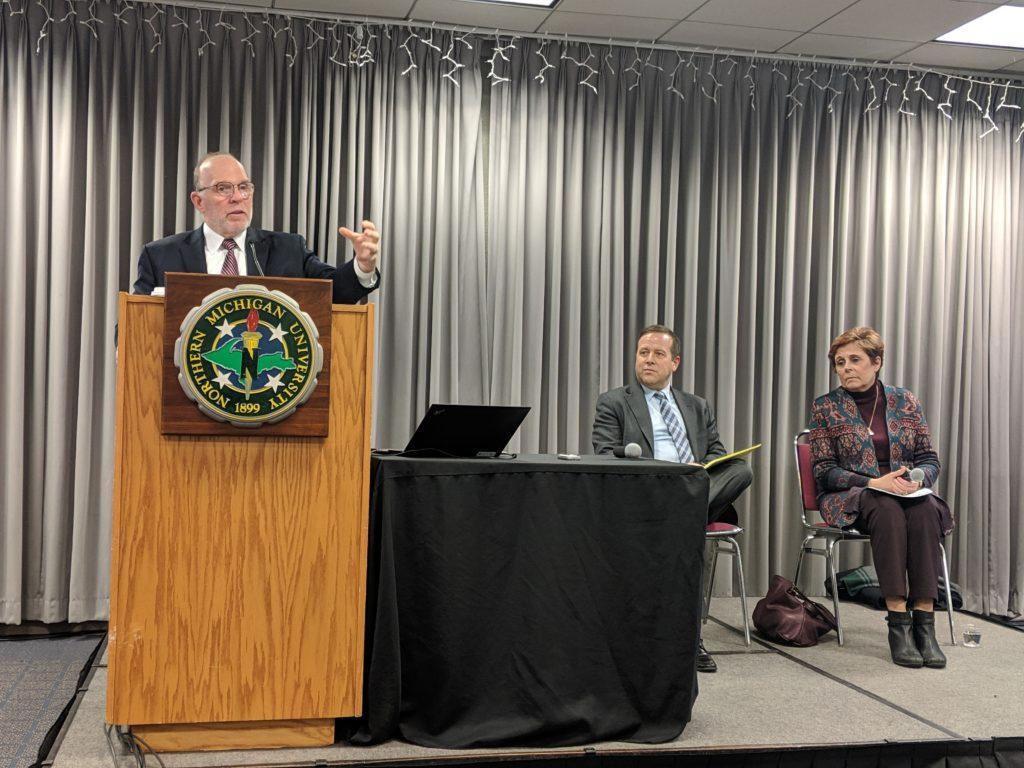More than 100 administrators, faculty and students gathered in the University Center on Wednesday, Jan. 23 during a university forum with discussions and updates about the Strategic Resource Allocation (SRA) Implementation Task Force (ITF) Recommendations Report and the Campus Master Plan that were presented to the Board of Trustees in December.
The changes being proposed in these discussions are designed to benefit the students and the changes in the needs of higher education, NMU President Fritz Erickson said.
“I think it’s important that we realize the last Campus Master Plan was done 10 years ago and if you look at today and what we’ve done on campus, it’s really amazing how much of that plan is done,”Erickson said.
He added how the changes aren’t exactly what the plan had laid out because of the changing vision of the university. The current priority is the plans for the Jacobetti Complex because of the capital outlay funding approval. The plans will explore options of renovation or relocation and there is pressure to begin these discussions, Erickson said.
“I think we have an obligation with that funding to step back for a minute and begin to have a dialogue,” Erickson said. “The challenge for us there is we have to have those discussions now because we have an obligation to the state.”
There are also discussions on maintaining the integrity of historical buildings on campus, Erickson said.
“We have a long history of tearing down buildings and I think that we should avoid tearing down some of the more historic buildings,” Erickson said in response to the future of buildings such as Lee Hall, which he said have their own identity on campus.
Erickson recommended a few options for reforming the academic programs and creating more flexibility for students in the changing needs of higher education within the SRA discussions.
“It’s very important to understand that what we have is the beginnings of recommendations. We don’t have decisions. We have ideas that need a full open and honest debate,” Erickson said. “We can do things differently than they do in Washington and we can explore ideas and see what might work.”
Erickson presented the ideas of reconsidering major requirements to offer students more chance for diversity in their degrees and limiting the size of the major to 36 credits.
Larger credit hour degrees make it more difficult for students to explore different options in their interest areas, Erickson said.
“The 150-year history of higher education is dedicated to preparing people to do one thing. That one thing is called a major,” Erickson said. “Our culture is built around the concept of a major and doing one thing. It’s so ingrained in who we are.”
The academic transformations will be done with the students in mind and provide enough time for them to transition with the larger structural changes, Erickson said. He added that they will need input when making these decisions and task force committees will be necessary.
Following the SRA ITF Recommendations Report update, Erickson opened the forum to audience comments and questions, most of which concerned the changes in major requirements.
Physics Department Head David Donovan suggested some majors have “hidden prerequisites” that would break the 36 credit major model, resulting in a lack of transparency with students in the major.
Center for Native American Studies Director April Lindala read a six-page prepared statement tracing NMU’s success and limitations in developing Indigenous studies programs.
“What if NMU’s next steps were to practice what we teach to critically think about the future we are leaving the seven generations to follow in our footsteps,” Lindala said. “I plead with the leadership of NMU to recognize the validity of ancient ways of being in these modern times.
Instead of merely of the status quo where Indigenous Studies might survive, why can’t Indigenous studies and disciplines like it be given what they need to thrive.”
Other questions and comments addressed the timeline of the implementation process and whether funding was a consideration in the SRA review process.
“We didn’t go into this process to cut budgets or to eliminate positions, that’s not what this is about,” Erickson said. “This is about making sure that we can build the university of the future. We have the opportunity to really lead a transformation in public higher education that very few institutions have.”




























